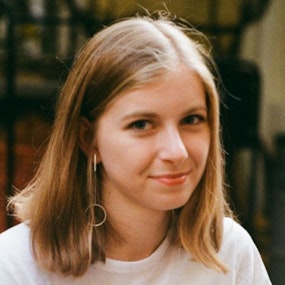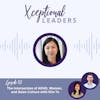Embracing ADHD and Neurodiversity as an Adult with Julia Ovcharenko

Our guest today is neurodivergent Ukrainian entrepreneur and mental health enthusiast, Julia Ovcharenko. She talks with Mai Ling about the stigma around ADHD and adjusting to ADHD and neurodiversity diagnoses as an adult, which is a very personal...
Our guest today is neurodivergent Ukrainian entrepreneur and mental health enthusiast, Julia Ovcharenko. She talks with Mai Ling about the stigma around ADHD and adjusting to ADHD and neurodiversity diagnoses as an adult, which is a very personal topic for Mai Ling, as she shares in the introduction segment before the interview. As the CEO and Founder of Numo ADHD, a new app for adults with ADHD, Julia is dedicated to creating a thriving community and vital resources for those with ADHD. The app has productivity aids, support groups, and many other features to assist users and help them “Unlock Your ADHD Wildness”.
Contact Mai Ling: MLC at mailingchan.com
Contact James: James at slptransitions.com
[00:00:00.600]
Julia: I'm not ashamed to share my story. I see it more as a mission, this is my message to all neurodivergent people in the room, in every room, so they also can share it more.
[00:00:21.000]
Mai: You're listening to the Exceptional Leaders podcast. Each week we give you a front row seat to our conversations with new and successful exceptional entrepreneurs and thought leaders making an impact. They share their intimate experiences so you can start, grow, and expand your impact. I'm Mai Ling, you can find me at mailingchan.com.
[00:00:37.800]
James: And I'm James Burgess of SLPtransitions.com. And today we have an amazing interview with Julia Ovcharenko. She's a neurodivergent Ukrainian entrepreneur and mental health enthusiast, serving as the CEO and founder of an app called Numo ADHD. And many things that you'll get from this interview, but at the top I want to mention that
[00:00:59.100]
James: She is in Ukraine. She's amidst a war, obviously. And if you're listening to this in November when we released this, the world is probably in war, which is horrible and sad.
[00:01:12.900]
James: And I, you know, we all know someone affected by this. But I want to say that Julia is a shining light because she finds this sadness and channels it into a way to connect with others. So her app has community built in, and it's for people with ADHD to connect and find accountability tools. And she mentions, I don't want to spoil it, but she talks about how it motivates her to work harder, bring people together. And I just think that's an amazing, inspiring way to not sugarcoat conflict in the world, but to use it as fuel and motivation to do something positive for the world.
[00:01:52.100]
Mai: Excellent. Thank you, James. I know we're kind of starting out on a heavy, serious note, but honestly, when we were referred to her, I was so excited to meet with her personally prior to doing the interview because that's what James and I do is we meet with somebody for at least 15 minutes, you know, to develop a just a foundational relationship. And I immediately knew that we needed to share her story on our show. So I hope that you enjoy listening to her. And I have to tell you, I do get a little emotional at the end. And it just I ask her the question finally, which is, you know, what is it like being an entrepreneur in the midst of, you know, war in Ukraine? And it hits me.
[00:02:29.500]
Mai: So I am going to if you haven't seen it already, I cut out the little clip and shared it out on social media because I really thought that that was something that I just wanted everyone to hear is that, you know, you see the news and maybe you read the news, but this is someone that
[00:02:45.000]
Mai: is really going through things and trying to make a difference in the world at the same time. And I just wanted everyone to kind of see and feel and touch that.
[00:02:53.800]
James: Yeah, I think through the personal stories we can really shine a light and give hope to other people. And one other thing she mentions that I liked is about mindfulness and how that helped her in her mental health journey. And in times like this or times in general, I think mindfulness is so important. I'm preaching to myself because I've let go of my mindfulness practice. But in University of California, Santa Barbara, Mei -Ling, I don't know if I told you this, but I was in a 30 -day mindfulness sort of study that was published in New York Times.
[00:03:26.500]
I didn't do the study.
[00:03:27.700]
James: I was the lab rat in it. But it was one of the most impactful things and habits that brought to my life.
[00:03:35.200]
James: whether or not you have ADHD, it's just proven so many benefits to connect white matter in your brain and deal with stress and not be super reactive, but also still be able to process your emotions without overriding them. So I love that she mentions that. And we talk about neurodivergence and superpowers and I know you talked about that in your own journey mailing. And with Chris Wang, which was another episode that listeners might wanna check out, another entrepreneur in the ADHD space.
[00:04:08.700]
James: And forgive me if I'm wrong, but isn't that how you met Julia was through Chris Wang?
[00:04:13.500]
Mai: Yes, I believe it was a referral from her. Thank you.
[00:04:16.000]
Mai: Yes, this was a really great interview for me because when you interviewed Chris, I was not really prepared to be so public about everything and in that episode, if you want to listen to our audience, you can go back and Google her. Oh, actually, it's on our notes, so just go to our show notes and we'll put the link there for Chris's interview. But I did share and it was kind of like coming out for me to really be so public in sharing. And James, I'm kind of getting emotional, but I've had a couple people who have known me personally or even as an audience who didn't know me before have reached out and told me that my interview or my section of that episode really connected with them. And I have one friend that told me that they were able to see some of those characteristics in their daughter. And so they were able to now move forward with a diagnosis. I've had other people that said that they're adults and they were like, hmm, you know what you're saying sounds like me.
[00:05:08.900]
Mai: And that's kind of where my journey started. So in this world of labels, you know, where I think that.
[00:05:14.500]
Mai: I don't know how you feel about it, but we've been onboarding slowly to pronouns and what your culture is and sexual orientation and all of these things. I did not feel like somebody who had to be so public, but with this diagnosis, I'm feeling like I get it now. I get it why people are sharing because there's community and you're kind of giving back and saying, you know, me too and I'm a part of this and let's connect and how can I help you? So I just wanted to share that and I want to thank you guys, our listeners, for just being so kind and so loving to me. Really, it's made a big difference.
[00:05:49.300]
James: Yeah, I love that. Yeah. I mean, every story, you don't know how it's going to impact someone. It can be even if it's one person and you share your story, you're helping someone feel seen. And how do you quantify that? I don't think you can, especially with ADHD is underdiagnosed in women and girls, as I understand. So the more awareness we can get out there, the better.
[00:06:12.800]
James: And speaking of awareness, Mai Ling, I know you had a conference recently. It's all about spreading awareness.
[00:06:19.800]
Mai: Yes, it was the Exceptional Alliances Epic accessibility event. It was online. It was amazing. We had 50 presenters. We had amazing keynotes. And if you saw the hype out there, it was real. I'm just so excited. It was everything that we thought it would be. If you are interested in checking out the replays, they are available on our site, exceptionallab.co, or exceptionalliancescom. And it's available to our community members. So definitely do that. And are you going to ASHA, James?
[00:06:49.700]
James: I'm not going to be able to make it this time, but we've got to divide and conquer. I think you're going, I hope.
[00:06:56.800]
Mai: Yes, yes, I'm so excited. I have a presentation. I've had a presentation every year now for, I don't even know how many years straight. I know, right? I'm so lucky. So this year it's session number 1220. It's called Beyond Clinical Service, Igniting Leadership. And I'm doing this together with
[00:07:11.900]
Mai: of our co -authors from the Becoming an Exceptional SLP book. So it'll be myself, Yao Du, Amy Hill, and Brian Goldstein. So if you're going to ASHA, it's Thursday, November 16th, 2023 at 4 o 'clock. So find us at session number 1220.
[00:07:29.400]
James: I'm getting ignited just thinking of this, that title alone, honestly.
[00:07:34.300]
James: But I'm going to have to watch.
[00:07:35.700]
James: I feel FOMO that I can't go. But everyone, I hope you enjoy that. And if you're like me and you can't go or you can go, you can still connect in other ways, like going on our social media or leaving us a review. We really appreciate it. And also not just because it helps more people find inspiring stories, but because we also know who we're talking to, what kind of content do you like. We're planning to post more inspiring stories to help people feel seen and
[00:08:03.100]
James: you know, grow that awareness on social media, whether or not it's people we interview. So just to, you know, light the candle that ignites a thousand flames speaking of ignition.
[00:08:15.000]
James: So yeah, with that, we appreciate you and enjoy the interview with Julia Ovcharenko.
[00:08:25.400]
Mai: Well, I'm really excited to be reaching across the globe to meet with Julia Ovcharenko, and she is located in the Ukraine. We met a couple of months ago and we said, we definitely need to share her story in light of what is going on in the world today and keeping in mind that life goes on and, you know, visions keep going and people are still working hard. So welcome, Julia.
[00:08:48.000]
Julia: Hi, thank you for having me.
[00:08:50.200]
Mai: So nice to have you. Thank you for putting up with our tech glitches that we had the other day. This is actually our second time trying to record, and I want to share with our listener, because they've been following along for a while, that my house renovation is almost done, but that day, I don't know what happened when we were trying to record, I had a total power outage, which was not related to construction, but related to the neighborhood and we were out for a couple hours. So we are trying again, trying to adjust our global schedules, and here we are. So I want to start out by saying that I was referred to Julia through Chris Wang.
[00:09:27.600]
Mai: Chris was a previous guest on the show. And if you look back, you'll see that she was with us a couple of months ago. She is the creator of the shimmer app, which is a focus on ADHD. And I am really so excited because her episode coincided with my own diagnosis of ADHD, which was really amazing. And cathartic and transforming for me. So she also
[00:09:50.200]
Mai: recommended Julia saying that you've got to learn about her and find out what she's doing with the Numo app. So Julia, long introduction, but I want to let you share in your words. How did you get started in this area of ADHD software?
[00:10:07.300]
Julia: So I'm the founder in mental health for more than three years. My first product and startup was connected to mindfulness. And during that work, because I'm like really big fan of mental health. I found out about ADHD, you know, like a lot of people around the globe from the internet, you know, I'm just, and I was like reading about ADHD. I was like, Oh my God. It was last year. And I wish I know it learned earlier because it explains a lot, you know, and in that like that
[00:10:38.200]
Julia: one moment, like just like switch with my life because I'm really like understood why I thought it's just like my personality and then I understood that there is like 350 million adults who also like struggle with ADHD and I like learn about this problem with like undiagnosed females that like now are like realizing that they have ADHD so the Yes, and this single thing inspired me to start NUMO and help other adults around the world and the United States also to live with ADHD and to be like get more dopamine and be like more supported every day.
[00:11:19.600]
Mai: That's amazing. I'm over here nodding my head. Oh my gosh. Yes. Yes. Yes. And so do you also have ADHD? Have you been diagnosed?
[00:11:27.300]
Julia: Yeah. Yeah. So when I learned about ADHD at all, I was like, Oh my God, it's looked like me. It's looked like my father. So I went to a psychiatrist and I made like a two hours test and then I got diagnosed. I'm like already like tried different techniques. I'm already tried some meds. Spoiler, it's not really works for me. And yeah, and I'm like still working like on my therapy with my like all of this like ADHD fame and everything. Yeah. So I'm, I'm deep inside, you know, in my personal journey, learning about my ADHD and also helping other people and learning their stories.
[00:12:06.600]
Mai: Thank you so much. And I feel like listening to your story, having this episode, reading people's blogs, all of this layering is helping people to learn more about themselves. And that's how I found out. The same things that you're saying as I was like, oh, that sounds like me. Oh, that sounds like me. And connecting these dots that I didn't really realize were there all my life. And as a speech language pathologist, obviously, I've been educated in the clinical diagnosis of ADHD, and I've worked with patients or clients, typically at the child level. And I really was able to say back then, oh, that's not me. That's ADHD. That's obvious, right? But as women and adults and people have gone through all of our lives trying to live with this, it looks different for us.
[00:12:52.600]
Mai: So thank you. Thank you for being open and honest and genuine and for your pivot, because it's going to benefit all us.
[00:13:00.200]
Mai: Interesting is you're not building it for them. You're building it for us.
[00:13:03.900]
Julia: Yes, totally. You know, when I'm speaking with our users, you know, and maybe you also know, if somebody else has ADHD, it's just like the connection is just like in one second. And we just like we know each other for a lot of years just because we're all the same. So this is like giving me so much of inspiration and you know, like this emotional fuel. When I when I read like some comments about our our solution helps and people are like happy and they are more productive. And yeah, so I really believe that like we can change something and it will be change the world into a better place for the urgent community.
[00:13:42.900]
Mai: Absolutely. Okay, so let's talk a little bit about the Numo app so that our listener gets an idea of exactly what this is that you're creating.
[00:13:49.900]
Julia: Awesome. So Numo is like a daily assistant for adults with ADHD. But I find out when I, you know, I find out about my ADHD, I started looking for different tools, how I can help myself. And I have like a strong product management background behind building a startup. And my co -founders are the same. And I look at it in the market and it looked like a lot of products was like how, as our users say, was built by a neurotypical psychiatrist. And I really believe that and I see that it's not really stick to neurodivergent people because it should be novel, it should be fun, it should be rewarding, it should be ADHD to, you know, to relate to ADHD. And we decided that we can change it because we are like really professional at building products.
[00:14:41.500]
Julia: And we started like from now, no more like covering two main areas. The first one is like productivity where our mind and our brain is a struggle with that. So like we have these like a daily planner, which is AI -powered. It helps to like prioritize the task. It helps to change the big task to the small little tiny steps. So you actually can like build this action plan and accomplish something.
[00:15:06.500]
Julia: There is like a focus tools, pomodoro, some like science -based stories, like about how to build a coping strategies in different areas about ADHD.
[00:15:17.800]
Julia: And what I like, what interesting that I find out when I find out about my ADHD, that people coming together into the groups and just like sharing between each other, what they will do. And this is like called accountability. And I was like, wow, interesting. A little bit of pressure, a little bit of adrenaline. This is something that we need. And this is something unique about Numo. So like we inbuilt this productivity part.
[00:15:41.500]
Julia: into support groups. This is like a digital group. So like, you don't need like to meet people, you know, on a call, but you always have like this opportunity to connect with them through the app and share your mood, ask some questions. And we also have like active community where people actually sharing, you know, some questions, some stories, you know, trying to get support. So it's been really fun.
[00:16:05.100]
Julia: I'm super excited because people are active and our power users, they are like having like 92 days streak. So like they using the app 92 days in a row.
[00:16:16.600]
Julia: And that girl, she like already accomplished more than 3000 tasks in Numa. So this is like super cool for me because it's my source of dopamine.
[00:16:28.400]
Mai: So the big question is, how do you keep ADHDers focused on the app, you know, keep coming back because that's me, you know, like I open something and I'm like, oh, wait, I needed to text this person and I needed to do that and then I had really gone to my phone to do, you know, post something on Facebook. So how do you get our attention?
[00:16:45.400]
Julia: This is like the main, the main, you know, the main question. So we are really built up and if you will check it, you will see that it's really look like it's built by native day origin people. So not just, you know, so we are like implementing like really cool gamification and this like community element. So this is our way, how we, how we increase retention and come back people to the app.
[00:17:10.400]
Mai: That's excellent. So I'm going to download NuMo now. Can you spell it for us so we know how to find it?
[00:17:16.000]
Julia: N -U -M -O -A -D -H -D. Perfect. Perfect. So easy.
[00:17:24.600]
Mai: If you're like me, you can't get enough of books, podcasts, blogs, and other ways to find out how to create, grow, and scale. That's why I brought together 43 disability -focused leaders to give you more of what you're looking for. You will hear their stories in bestselling books which focus on general offerings, augmentative and alternative communication, and speech language pathology. I invite you to search for Becoming an Exceptional Leader on Amazon so you can learn intimate startup pearls of wisdom and keep growing your brilliant idea.
[00:17:57.000]
Mai: Now, let's get back to our amazing interview. Okay. So we've been talking a lot on the show about those of us who do have a identified disability. So something that we know could be seen as a stigma, a prejudice out there. Do you have any concerns of sharing your own personal information when you're working with investors or possible partners?
[00:18:21.100]
Julia: So I know about the stigma and I have some friends who are saying, oh, I have ADHD, but please don't don't tell anybody. So I see my mission as a person, you know, because I'm also like struggle of this, like, even before I know about my ADHD, I always have this shame because I am somehow not really fit and I'm like more, I don't know, like extravagant person. And people look like I'm weird. And, you know, my my friends want to go go and work in Google, but I want to go in creative agency because this is like, you know, something for ADHD or
[00:18:54.700]
Julia: So I'm not ashamed to share my story. I see it more as a mission. This is like my message to all neurodivergent people in the room, in every room. So they also can share it more. Yes. And even some people don't understand, I think.
[00:19:14.000]
Julia: Some people say, oh, just try harder or just get a planner, you know?
[00:19:19.500]
Julia: But I know that even in the community of investors, of entrepreneurs, there are a lot of people with ADHD and they do understand. And I think the only way for us is just to share it as much as you can, and honestly, and share the personal story. So more people will also unmask. And we will have a better situation in our neurodivergent community.
[00:19:46.200]
Mai: I love that and you use the word unmasked. I have been in this professional space and working in the neurodivergent community for a while and I saw the word masking for a while but I did not realize again because I was not attributing myself to these types of symptoms, I did not realize that I did that. So I'll share a little bit of what it looks like for me and then maybe you can expand but I know there are days when I'm a little verbose which my mom would call verbal diarrhea and also not having filters.
[00:20:17.500]
Mai: I just want to say it and so I would just blah blah blah blah.
[00:20:20.500]
Mai: It's crazy that I have a podcast because I really am struggling so hard to stay here, stay focused, say the things that are relevant to what you're saying. But when I finally understood masking and that was from hearing it from other people's stories,
[00:20:36.900]
Mai: I realized that yeah, there are times when I just know that I'm too much and I use that word, I'm extra. I'm a little too extra today and I'm literally like biting on my back teeth, like, okay, stop. Just stay here, listen. Don't go into the I statement, don't go into the next thing that you're thinking about because you need to respect the person you're talking to and stay in the conversation. So I realized how much masking I do and how much that drains you, right? So when you leave from talking with somebody, it's like, oh, okay, now I can go back to the seven thoughts that I have in my head going on. So what does that look like for you when you say unmasking?
[00:21:14.400]
Julia: Yeah, so it's also about like, I'm like, really, you know, this like easygoing and like imposing person and I have my team with whom we like we work on NUMA and I was like, oh, let's do that and let's do that and I have this idea and I have that idea.
[00:21:28.400]
Julia: I will not say that ADHD is 100 % super power, because I also struggle a lot and I have these impulses every two minutes, this is crazy, but I also do enjoy ADHD and this is something that I want to unmask because I'm trying to use the strength of that and not be ashamed of being too much because this is something, it's also like the part of the mission. When I unmasked, some other people see it and a lot of my friends just started to reach it out to me after I started sharing publicly about ADHD, even some of my boss who is like 50 years old was like, oh, I also have ADHD, I was like, oh my god, I never know. And so, yeah, so maybe haters are going to hate, I think some people are still going to say that you're too much.
[00:22:19.800]
Julia: But I'm just seeing this super positive feedback from people who are neurodivergent. So I'm really focusing on that part. And because there is always some people who say that you are bad and you're a loser and this is a disability. But this is just not a disability. It's just a part of who we are. This is our psycho nature. And I'm super excited to learn about that more on myself and teach our users how to do that. Because I know that ADHD is complicated and it's been super hard sometimes. And I just cannot, you know.
[00:22:55.800]
Julia: I'm just always in this space of my thoughts. But there is so much people like us, like me and like you.
[00:23:05.500]
Julia: And I'm not really seeing it like a disability, you know. Maybe being neurotypical and being boring is a disability.
[00:23:16.200]
Mai: I know, that's funny. You talked about medication and I'm starting that journey in the next couple of months and I was thinking, you know, do I, is it going to change me? Am I going to still like myself? So that's, that's interesting. I wanted to bring up that I just recently did a LinkedIn live stream interview with Natalia Lykowski and she is the global neurodiversity advancement leader for IBM. So for our listener, please hop over to exceptional lab on LinkedIn and you'll see this interview with her and she talks about how they have been educating and, and supporting and working towards embracing their employees at IBM with neurodiversity. And it's just been incredible. And I'm so excited. And when she speaks, she talks about her train of thought as a Roomba. Do you know what that is?
[00:24:05.600]
Mai: The Roomba vacuum cleaner?
[00:24:07.400]
Julia: Oh, no, I thought it was a dance, you know,
[00:24:10.400]
Mai: Roomba. Yes, that's, that's a dance too. So this one is a vacuum cleaner and it can
[00:24:15.600]
Mai: vacuum on its own. So it sets up to your Wi -Fi, you can put it on a schedule or you can just press the button and it goes and it'll do the room. And the way that it knows or maps out the room is it has like this little, not a sensor, but it's a physical piece that when it bumps into something, it resets, it like pivots. So there's all these memes about what it says when it hits and they're like, oh, dang, darn, darn it, suit, you know, like I'm lost. And it's funny, it doesn't really do that, but you can this little circular thing bumping into things and redoing it.
[00:24:45.700]
Mai: And so she says that her mind's like a Roomba, you know, she's like, oh, I went over, oh, now I'm thinking something else. Oh, wait, what about that? You know, and it was just such a great visual of how our brains are. I love it. I love it. But I really do encourage everyone to go listen to her. I love the work that she's doing over there.
[00:25:02.500]
Mai: Okay, so the last question I have is probably a little politically charged, but just do the best you can to let us know on this side of the pond area, you know, over in the U .S. What is it like to be a startup in the Ukraine? Right now, it is October of 2023. And Julia, you know, our hearts are with you and your team. And I know that you guys are doing the hard work in a very intense situation.
[00:25:26.500]
Julia: Yeah, so I think in the first month, it's been like super, extra complicated mentally. And this is like a shock, you know, like all of your previous lives, you know, we will never come back to that phase, you know, everything, everything's changed forever. And but I think like this situation like change us a lot, you know, something that like not killed you, making you more powerful. So I'm trying to it's still hard. It's still like still going, you know, I'm in a safe place. Kyiv is like the capital where like, you know, Biden has been here like
[00:26:01.300]
Julia: So a lot of world leaders have been here, they have a super cool air defense, thank you to the United States for that and for our partners. And I really hope and pray that this will finish as soon as possible, because it should not be like that in the heart of Europe. Yes, but for me personally and for my team, I find so much inspiration even during these dark times on helping people around the world. Because our users are mostly in the United States, in Canada, in Australia, and speaking with this global audience and having this voice from Ukraine hearing around the world. So this is something that keeps us going and gives us hope and dopamine and everything.
[00:26:54.000]
Julia: Worry is bad. Yeah, you know, super tired to live in like historical times, you know.
[00:27:02.500]
Mai: Look, I can't even talk. I'm all overwhelmed. Thank you. Thank you for sharing with us and for being here and know that our hearts are with you and we're doing everything we can to support and I hope that this show helps to share what Nummo and you and your team are working so hard to create and share with us.
[00:27:19.600]
Julia: Thanks a lot for like doing this podcast and the voice of neurodivergent community. I totally will go and watch that episode about neurodivergency in IBM and I'm super happy to meet you. I hope it's like not our last meeting.
[00:27:34.700]
Julia: Yeah, and I'm super excited to join.
[00:27:37.000]
Mai: Yes. Okay. So tell us, how can we stay in touch with you and support the work that you're doing?
[00:27:41.100]
Julia: Yeah, so actually, like we are running our first clinical trial and we are offering like users to test NUMO for free for two months and we are doing that with a PhD in neuropsychology. So if you want to do that, you can just go on like NUMO website and then you can apply to the clinical trial and that can be like the great support. And what else, please, and must please share about your neurodivergency in your family and we will keep going step by step to the world that will be like more neuro -inclusive and our kids can be like more, you know, open about that and be more happy about their neurodivergent brains.
[00:28:22.600]
Mai: Beautiful. Thank you, Julia Ovcharenko with Numo. Thank you for joining us and we will definitely be staying in touch.
[00:28:29.500]
Julia: Bye.
[00:28:32.500]
Mai: We hope you enjoyed this episode and invite you to leave us a review on Apple Podcasts and Spotify and share the show with people you think will find value from it. This helps the show a lot. Or have a great guest referral? Reach out to us at xleaders at gmail .com.
[00:28:48.200]
James: And if you want exclusive tips on becoming an exceptional leader, deliver straight to our inbox, just go to exceptionalleaders .com and sign up for our mailing list. Thanks for listening.

New to Xceptional Leaders with Mai Ling Chan & James Berges?
Here are some great episodes to start with. Or, check out episodes by topic.











